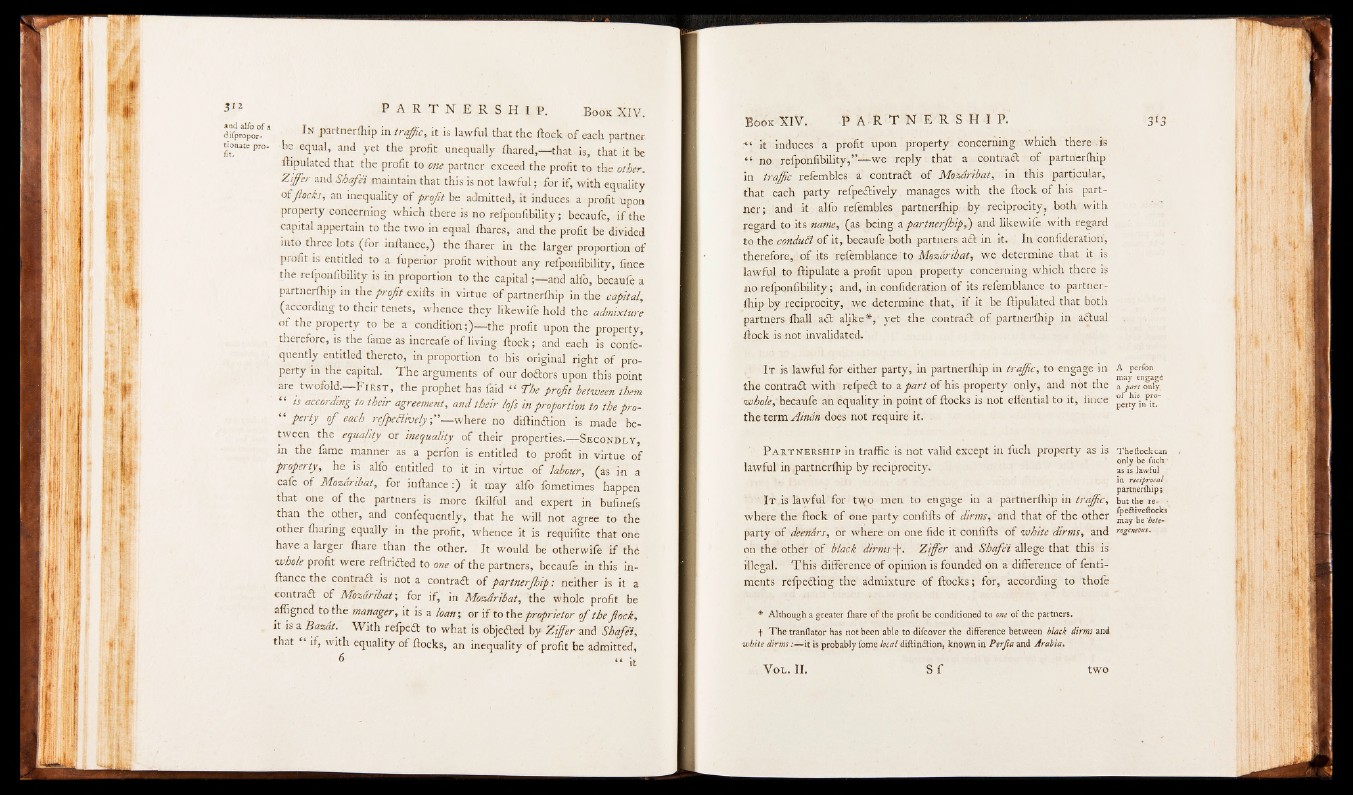
P A R T N E R S H I P . B o o k XIV.
and alfo of a
difpropor-
tionate pro-
§
a
In partnerfhip in traffic,, it is lawful that the Rock of each partner
be equal, and yet the profit unequally fhared,— that is, that it be
ftipulated that the profit to one partner exceed the profit to the other.
Ziffer and Shafei maintain that this is not lawful; for if, with equality
o f flocks, an inequality of profit be admitted, it induces a profit upon
property concerning which there is no refponfibility; becaufe, if the
capital appertain to the two in equal Ihares, and the profit be divided
into three lots (for inftance,) the iharer in the larger proportion of
profit is entitled to a fuperior profit without any refponfibility, fince
the refponfibility is in proportion to the c a p i ta la n d alfo, becaufe a
partnerfhip in the profit exifts in virtue of partnerfhip in the capital,
(according to their tenets, whence they likewife hold the admixture
of the property to be a condition;)— the profit upon the property,
therefore, is the fame as increafe of living Rock; and each is confe-
quently entitled thereto, in proportion to his original right of property
in the capital. The arguments of our doftors upon this point
are twofold.— First, the prophet has faid “ th e profit between them
“ ts according to their agreement, and their lofs in proportion to the property
o f each refpedlively— where no diftindtion is made between
the equality or inequality of their properties.— Secondly,
in the fame manner as a perfon is entitled to profit in virtue of
property, he is alfo entitled to it in virtue of labour, (as in a
cafe of Mozaribat, for inftance:) it may alfo fometimes happen
that one of the partners is more fkilful and expert in bufinefs
than the other, and confequently, that he will not agree to the
other fharing equally in the profit, whence it is requifite that one
have a larger fliare than the other. It would be otherwife if the
whole profit were reftridted to one of the partners, becaufe in this inflance
the contract is not a contract of paptnerjhip: neither is it a
contrail of Mozaribat', for if, in Mozdribat, the whole profit be
affigned tpthe manager, it is a loan-, or if to the proprietor o f the flock,
it is a Bazdt. With refpedl to what is objedted by Ziffer and Shafei,
that j if, with equality of flocks, an inequality of profit be admitted,
it induces a profit upon property -concerning which there .te
“ no refponfibility,’’— we reply that a contrail of partnerfhip
in traffic refembles a contrail of Mozdribat, - in this particular,
that each party refpeilively manages with the flock of his partner;
and it alfo refembles partnerfhip by reciprocity, both with
regard to its name, (as being a partnerfhip„) and likewife with regard
to the condudt of it, becaufe both partners ail in it. In confideration,
therefore, of its refemblance' to Mozdribat, we determine that it is
lawful to flipulate a profit upon property concerning which there is
no refponfibility; and, in confideration of its refemblance to partner-
fhip by reciprocity, we determine that, if it be ftipulated that both
partners fhall act alike*,' yet the contract of partnerfhip in actual
flock is not invalidated.
I t is lawful for either party, in partnerfhip in traffic, to engage in
the contrail with refpedl to a part of his property only, and not the
whole, becaufe an equality in point of flocks is not effential to it, fince
the term Ainan does not require it.
Partnership in traffic is not valid except in Rich property as is
lawful in .partnerfhip by reciprocity.
It is lawful for t\yo men to engage in a partnerfhip in traffic,
where the flock of one party confifts of dirms, and that of the other
party of deendrs, or where on one fide it confifts of white dirms, and
on the other of black dirms -fa Ziffer and Shafei allege that this is
illegal. This difference of opinion is founded on a difference of fenti-
ments reflecting the admixture of flocks; for, according to thofe
* Although a greater fhare o f the profit be conditioned to one o f the partners.
f T h e tranflator has not been able to difcover the difference between black dirms and
white d i r m s it is probably fome local diftin&ion, known in P erjia and A rabia.
S f
A perfon
may engagé
a part only,
of his property
in it.
The flock can
only be fiich
as is lawful
in reciprocal
partnerfhip;
but the re- •
fpeftiveftocks
may be heterogeneous.
VOL. II. two